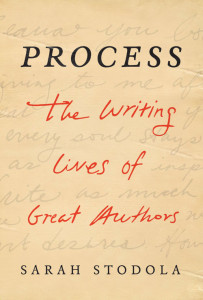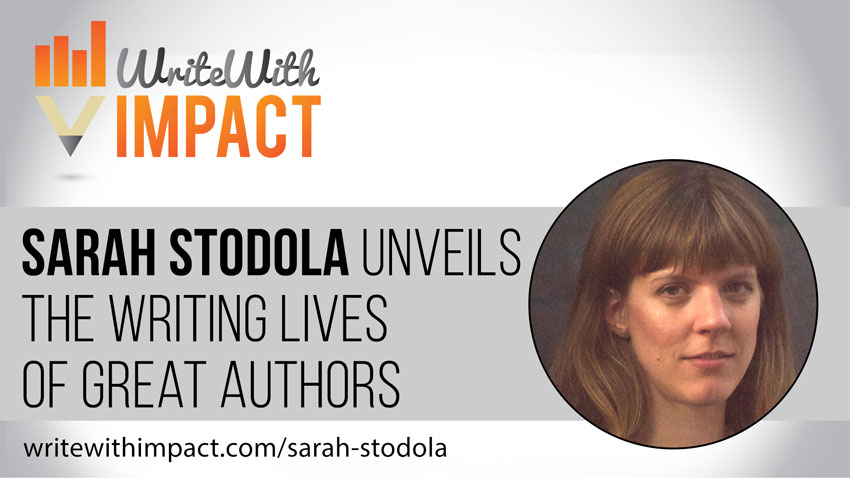Podcast: Play in new window | Download
Have you ever wondered how the great novelists approach the craft of writing? This might be of particular interest if you’re a writer of fiction. But even if you don’t write fiction but instead focus on writing non-fiction like me, you might be interested in the lessons that can be learned from the great writers of our time.
This is exactly the topic of a new book by Sarah Stodola, Process: The Writing Lives of Great Authors, which was recently released by Amazon Publishing. It’s a look into the techniques, inspirations and daily routines of 18 authors that have captured our imaginations since the turn of the 20th century, including Kafka, Hemingway, Virginia Woolf, David Foster Wallace, Toni Morrison, Margaret Atwood and more.
the topic of a new book by Sarah Stodola, Process: The Writing Lives of Great Authors, which was recently released by Amazon Publishing. It’s a look into the techniques, inspirations and daily routines of 18 authors that have captured our imaginations since the turn of the 20th century, including Kafka, Hemingway, Virginia Woolf, David Foster Wallace, Toni Morrison, Margaret Atwood and more.
Sarah contributes to publications such as The New York Times, The Wall Street Journal, Condé Nast Traveler and Slate, among others. She’s also the editorial director of Brooklyn-based Strolby, an online place for discovering and shopping the world’s best brick-and-mortar shops.
You can reach Sarah on Twitter @sstodola and on Tumblr at Behind the Page
Highlights & Take-Aways
Common threads among the writers she studied
- Far more writers work well in the morning. Getting up in the morning and getting straight down to the writing seems to be the best way for these writers to work.
- The benefits of taking a walk everyday at midday or doing some other activity that takes them away from the writing desk and out of the head space of writing. Margaret Atwood, for example, finds doing rote everyday chores such as housework a time when she generates some of her best ideas for her novels.
- During the course of her research, Sarah was surprised to discover how many drafts even the great writers go through before producing the final draft that is their masterpiece.
- Most of the writers she studied are very regimented in their work routines. They stick to strict daily schedules, and hone a lifestyle around their writing career. Most of their lives are more prosaic than most people imagine.
Surprising anecdotes about the great writers
- Virginia Woolf kept notebooks – and maintained a filthy study.
- Jack Kerouac wrote his first novels on 150 foot scrolls to make sure he wouldn’t reach the end of the page and stop writing. He spent three years developing his first novel before actually writing it in a three-week period.
- Vladimir Nabokov wrote on makeshift desks in bathtubs and in the back seat of his car to escape noise and distraction.
- Toni Morrison didn’t start writing until the age of 35 and wrote her first novel while raising her young children.
- Ernest Hemingway was obsessed with the painter Paul Cezanne and strove to write in a style that mirrored his brush strokes. He wasn’t drunk when he wrote, contrary to popular legend.
- Margaret Atwood is an avid user of social media and has written novels and stories on the Wattpad app.
What she learned about her own writing process
Sarah has learned to accept her limited capacity to write past four hours in one session. Before writing the book, she felt a sense of guilt if she couldn’t write through the entire day. But after completing her research she realized that most writers can’t write more than 4-6 hours per day. She quotes Hemingway as saying that noone should try to write for more than six hours at a time.
Advice for writers
- Don’t go hard on yourself with your first drafts. A lot of writers start out feeling they have a great idea and should be able to write it, but then it’s not up to the standards they want or need to get published, and that becomes an ending point for a lot of writers. Knowing that even the best writers in the world often write crappy first drafts is an important take-away, and should encourage aspiring writers.
- Read a lot. Even if it’s just for half an hour or an hour a day, reading the work of other great writers, you can’t help but absorb it and start to get your own ideas for how you can apply certain techniques that work well for them and that you can apply to your own writing.
The book that inspired her to become a writer
Back in college, reading Edith Wharton’s The Age of Innocence lit the spark for Sarah and inspired her to become a writer.


Very interesting! Amazing to know how these great writers devised ways to keep their creativity alive and be regimented with them on keep on going.